|
|
|
Sort Order |
|
|
|
Items / Page
|
|
|
|
|
|
|
| Srl | Item |
| 1 |
ID:
130443
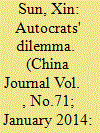

|
|
|
|
|
| Publication |
2014.
|
| Summary/Abstract |
How do authoritarian elections affect voters' attitudes toward the regime and their support for democracy? This article draws upon the case of village elections in China to argue that elections may have two simultaneous effects. First, free and fair elections increase citizens' confidence in the government. Second, elections also allow voters to exercise political rights and accumulate democratic experience through participation, and this in turn may trigger greater demand for further empowerment. Empirical analysis of data from a two-round nationwide survey conducted in 114 villages confirms both effects. One implication of these findings is that competitive elections may simultaneously boost regime popularity and increase public demand for further democratic reform.
|
|
|
|
|
|
|
|
|
|
|
|
|
|
|
|
| 2 |
ID:
071709
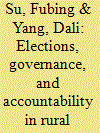

|
|
|
|
|
| Publication |
2005.
|
| Summary/Abstract |
While competitive elections are a crucial aspect of village democracy, they are only one means to achieving good governance. In this article, we consider village elections in the broader context of improving governance in China. We argue that the promotion of village democracy should be complemented by simultaneous improvements in a number of other non-electoral areas that enhance the accountability of public officials. The Chinese central government has paid greater attention to these institutional aspects in recent years. The leadership is willing to encourage local experiments and tolerate some unorthodox practices. This interaction between local initiatives and central interventions will shape the future of village democracy in rural China. We analyze several of them in particular: tax-for-fee reform, new accounting practices, village affairs disclosure, and institutionalized participation in democratic decision making. This article reveals great diversity and discusses the politics of these institutional changes.
|
|
|
|
|
|
|
|
|
|
|
|
|
|
|
|
| 3 |
ID:
088454
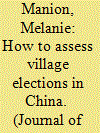

|
|
|
|
|
| Publication |
2009.
|
| Summary/Abstract |
In assessing Chinese village elections we must sort and discriminate as we consult the 'mountain of evidence' that has accumulated over the past two decades. We can find anecdotal evidence to support practically any claim about village democratization, but from such stories we can learn nothing about the status, trends, or patterns of village democratization. This article evaluates what we can learn and have learned about grassroots democratization in the Chinese countryside from nationally and locally representative sample survey data.
|
|
|
|
|
|
|
|
|
|
|
|
|
|
|
|
| 4 |
ID:
167487
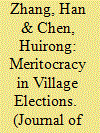

|
|
|
|
|
| Summary/Abstract |
Local governments in China face a fundamental ‘democracy dilemma’ in rural governance: although elected village cadres may not be capable or controllable, local governments cannot change or abolish village self-government, as enshrined in China’s Constitution and the national laws. However, there has recently been a new way of dealing with this dilemma for local governments: called the ‘Separation of Election and Employment’ (xuan pin fenli, SEE) [of village cadres]. Based on an in-depth case study of a Zhejiang county, this article argues that SEE is a typical type of institutional layering, which adds a new meritocratic village cadre management system onto existing village democracy. This is a path-dependent institutional change, emulating the Chinese Communist Party’s nomenklatura and bianzhi systems. This research has broader implications concerning gradual institutional change and political meritocracy.
|
|
|
|
|
|
|
|
|
|
|
|
|
|
|
|
| 5 |
ID:
178634


|
|
|
|
|
| Summary/Abstract |
While democratization is regularly associated with elite renewal, established elites often succeed in maintaining their dominance after the fall of the authoritarian regime that fostered them. This constitutes a relatively understudied challenge facing democratization processes: when and how do democratic reforms succeed in fostering the emergence of new elites? This paper addresses this question through a study of village head elections in three rural districts around Yogyakarta, Indonesia. Comparing older studies of village head elections with ten in-depth studies of recent village head elections as well as assessments of the backgrounds of eighty village heads (kepala desa), this paper shows that a remarkable change has taken place. Whereas up to ten years ago many villages were still ruled by leaders from established families with a quasi-hereditary grip on power, in recent years such leaders are rapidly being replaced by village heads with more modest family backgrounds and a different style of leadership. This important change has resulted from a combination of democratic reforms, the diversification of rural economies, and the particularly competitive character of village head elections. Elite renewal is possible when open and information-dense elections coincide with a process of economic diversification undercutting the economic dominance of established elites.
|
|
|
|
|
|
|
|
|
|
|
|
|
|
|
|
| 6 |
ID:
092872
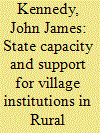

|
|
|
|
|
| Publication |
2009.
|
| Summary/Abstract |
For successful political reforms, such as village elections or elimination of arbitrary fees, the central party-government must have the political capacity to implement new laws down to the village level. Thus for researchers as well as government officials, it is important to have accurate measures of reform success or failure. There are two equally important measures that are closely tied to state capacity. One measure is the top-down level of commitment that county and township officials have towards implementing reforms. That is, whether these new institutions exist and function at the village level. The second measure is the bottom-up villager evaluation of local institutional procedures and cadre behavior. Using data collected in one northwest province in 2000 and 2004, findings show that implementation of some reforms, such as village elections, is uneven, while other reforms, such as the 2002 tax-fee reforms, were more successful. There are two implications from this study. One is that the central party-government lacks the commitment rather than the capacity to fully implement village elections. The urgency of relieving villagers' tax-fee burdens that were perceived as the source of rural unrest and instability was more important than the development of village elections. Second, in villages where the reforms are fully implemented, villagers make a clear conceptual distinction between popular support for the elected leaders and the election process. That is, they display disgust for the elected leaders and support for the election process and the village fee system. However, in villages where reforms are not fully carried out, villagers exhibit a more uniform lack of support for leaders and local institutions.
|
|
|
|
|
|
|
|
|
|
|
|
|
|
|
|
| 7 |
ID:
140476
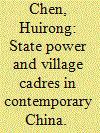

|
|
|
|
|
| Summary/Abstract |
In the case of land transfer in rural China, why do some village cadres act as entrepreneurs, some become middlemen between agribusinesses and peasants, and others choose to be passive bystanders? Based on comparative case studies in Shandong province, it is argued that state power, rather than village elections, informal solidary groups and economic benefits, is the dominant explanatory mechanism. This article suggests that our discussion of the state–village cadre relationship should not be limited to the control perspective. To achieve policy objectives, village cadres' ability and creativity are as important as motivation to local government. Substantial support makes village cadres more capable, and some degree of leeway is necessary for creativity. Local government relies on three forms of leverage (control, support and non-intervention) to address three issues (motivation, ability and creativity) in shaping behavioral patterns of village cadres.
|
|
|
|
|
|
|
|
|
|
|
|
|
|
|
|
| 8 |
ID:
089395
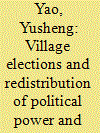

|
|
|
|
|
| Publication |
2009.
|
| Summary/Abstract |
This study of competitive elections in a northern China village identifies two contradictions: one between villagers and village officials, the other between village elite and those seeking power. The one between villagers and the old leadership in the village focuses on the latter's corruption and bad governance, which had led to serious erosion and unfair distribution of the collective property. The one between villagers and the new leadership lies in the latter's failure to address the problems left by the old leadership. Both led to popular discontent and fuelled political participation. The contradiction between elite members focuses on competing for political office, which has resulted in the formation of factions and factionalism in both election and post-election politics and has become a salient feature of the village politics. The investigation of this village with governing problems found that free elections have brought about a radical redistribution of political power, but little satisfaction to villagers because their deep-seated desire for a fair redistribution of the collective property remains unfulfilled.
|
|
|
|
|
|
|
|
|
|
|
|
|
|
|
|
| 9 |
ID:
110017
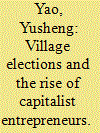

|
|
|
|
|
| Publication |
2012.
|
| Summary/Abstract |
This study examines a series of four direct elections and their impact in an industrialized Chinese northern village. It finds that direct elections empowered villagers and the new economic elite to remove the old, entrenched and corrupt leadership. However, the few capitalist entrepreneurs who dominated the elections and the new leadership neither abided by the rules of political competition nor tried to govern democratically. On the other hand, villagers did not feel empowered to participate in the governing process despite the establishment of democratic institutions. After initial enthusiasm for direct elections, many villagers either became politically apathetic or felt helpless and nostalgic for the return of a benevolent authoritarian leader. This study finds that after four rounds of direct elections, little progress had been made in democratic elections and governance. This was mainly because the new economic elite did not want to be checked by democratic rules and institutions while villagers had not learned to use democratic institutions to hold their elected leaders accountable.
|
|
|
|
|
|
|
|
|
|
|
|
|
|
|
|
| 10 |
ID:
089396
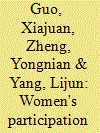

|
|
|
|
|
| Publication |
2009.
|
| Summary/Abstract |
Drawing on the data collected from three surveys in China's Zhejiang province during the period from 1999 to 2006, this article attempts to examine women's political participation in village autonomy and village elections in China. The data show that while men and women have obtained a very similar level of self-awareness and motivation in terms of political participation, China's patriarchal system, embedded in various forms of mindset and political practice, continues to constrain rural women's political involvement in a substantial way. The gender gap remains and the proportion of rural women in local power structures is declining. The article explains both the similarities and differences between men and women in rural political participation, and identifies some major causes for the decline of women's share in grassroots leading positions. It shows that there is no causal linkage between economic development and the improvement of women's political participation, and that the lack of political and other systematic supports leads to the low proportion of women in local power structures.
|
|
|
|
|
|
|
|
|
|
|
|
|
|
|
|
|
|
|
|
|